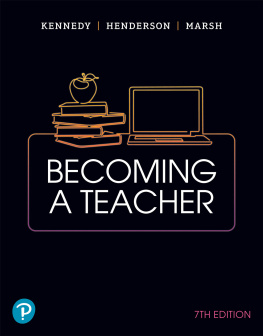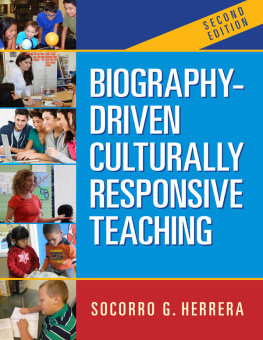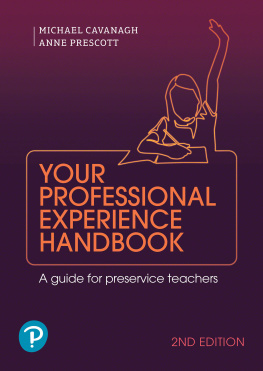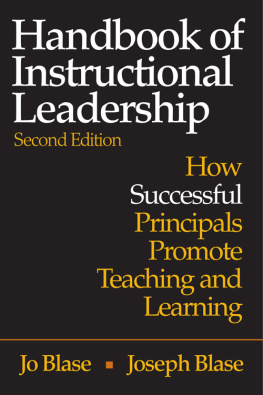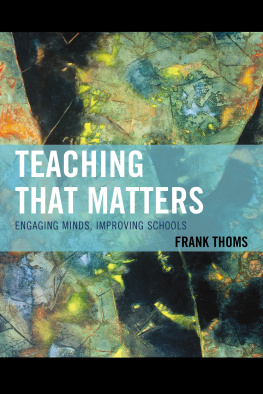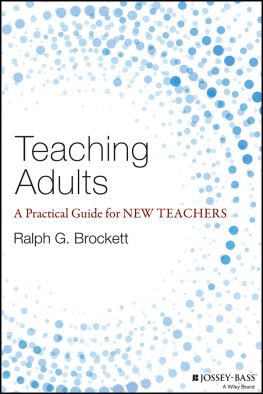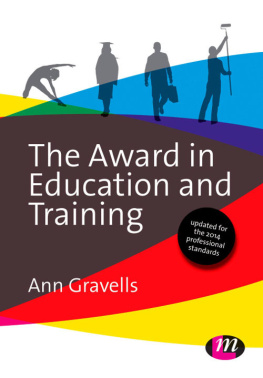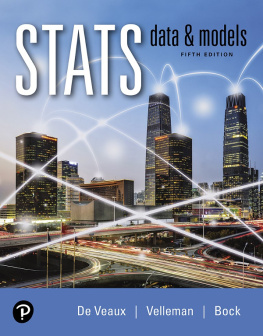
Becoming a Teacher
Becoming a Teacher
7th edition
Copyright Pearson Australia (a division of Pearson Australia Group Pty Ltd) 2022
Pearson Australia
707 Collins Street
Melbourne VIC 3008
www.pearson.com.au
The Copyright Act 1968 of Australia allows a maximum of one chapter or 10% of this book, whichever is the greater, to be copied by any educational institution for its educational purposes provided that that educational institution (or the body that administers it) has given a remuneration notice to Copyright Agency Limited (CAL) under the Act. For details of the CAL licence for educational institutions contact:
Copyright Agency Limited, telephone: (02) 9394 7600, email:
All rights reserved. Except under the conditions described in the Copyright Act 1968 of Australia and subsequent amendments, no part of this publication may be reproduced, stored in a retrieval system or transmitted in any form or by any means, electronic, mechanical, photocopying, recording or otherwise, without the prior permission of the copyright owner.
ACARA material is identified in this text as Australian Curriculum, Assessment and Reporting Authority (ACARA) 2010 to present, unless otherwise indicated.
ACARA material is licensed under CC BY 4.0 (https://creativecommons.org/licenses/by/4.0). Version updates are tracked in the Curriculum version history section on the About the Australian Curriculum page (http://australiancurriculum.edu.au/about-the-australian-curriculum/) of the Australian Curriculum website.
ACARA does not endorse any product that uses the Australian Curriculum or make any representations as to the quality of such products. Any product that uses material published on this website should not be taken to be affiliated with ACARA or have the sponsorship or approval of ACARA. It is up to each person to make their own assessment of the product, taking into account matters including, but not limited to, the version number and the degree to which the materials align with the content descriptions and achievement standards (where relevant). Where there is a claim of alignment, it is important to check that the materials align with the content descriptions and achievement standards (endorsed by all education Ministers), not the elaborations (examples provided by ACARA).
For the Australian Professional Standards for Teachers 2018 Education Services Australia Limited as the legal entity for the COAG Education Council (Education Council). Pearson Australia has reproduced extracts of the Australian Professional Standards for Teachers in this publication with permission from the copyright owner. Other than as permitted by the Copyright Act 1968 (Cth), no part of this material may be reproduced, stored, published, performed, communicated or adapted by any means without the prior written permission of the copyright owner.
This text was in production during the COVID-19 pandemic. Content which relates to COVID-19 and its broader impacts was correct at the time of printing.
Senior Portfolio Manager: Stephen Heasley
Development Editor: Judith Bamber
Senior Project Manager: Bronwyn Smith
Production Manager: Linda Chryssavgis
Product Manager: Nina Sharpe
Content Specialist: Victoria Kerr
Rights and Permissions Editor: Kim Morgan
Digital Production Manager: Paul Ryan
Lead Editor/Copy Editor: Dina Cloete
Proofreader: Helen Eastwood
Indexer: Integra Software Services
Cover and internal design by Simon Rattray, Squirt Creative
Cover illustrations: line drawing of an apple tetiana_u/Shutterstock; line drawing of laptop and books on a desk 1494/Shutterstock
Typeset by Integra Software Services
Printed in Malaysia
ISBN 9781488615658
1 2 3 4 5 26 25 24 23 22

Pearson Australia Group Pty Ltd ABN 40 004 245 943

Brief Contents
Contents
Preface
Becoming a teacher is no easy undertaking but it can provide a life-long journey working with young people who will become the citizens of tomorrow. In reality it is privileged work because it can influence the future by helping students to understand themselves and the world in which they live. At the same time, it is also demanding work because no two students are exactly alike. A teachers ingenuity is challenged every day as students seek to be who they are, and as teachers seek to help them prepare for the future. Teachers and students working together is the ideal way to think about the world of classrooms and the shaping of the future.
This is the seventh edition of Becoming a Teacher. We have been very happy to work on it in acknowledgement of our friend and colleague, Colin Marsh, who was the originator of the text. Unfortunately, his untimely death in 2012 deprived us and the whole education community of a scholar for whom teachers were at the forefront of his work. He completed the first five editions of the text. The sixth edition, initiated by Colin and produced after his death, was finalised by Maggie Clark from the University of Western Sydney and Sharon Pittaway from the University of Tasmania. We have built on the work of those who have contributed before us and we are grateful for their contribution. We are particularly grateful for Colins vision in initiating the text and seeing it through so many editions. We have attempted to maintain the spirit of his original work while adapting it to new needs and priorities.
In preparing this edition we have kept in mind the busy lives of those studying to become teachers. Each chapter sets out learning objectives, highlights professional terminology, provides the opportunity for reflection and includes a case study to highlight the practice of schools and teachers. Each chapter also has a summary of its contents at the end, and an extensive list of references that can be followed up where greater depth of understanding is needed on particular issues.
The first thing that readers of the sixth edition may note in this new edition is that the number of chapters has been reduced, from 20 to 15. The purpose of this reduction has been to integrate content in order to make it more accessible. We have highlighted key issues in Australian education such as the Australian Curriculum, NAPLAN testing, social media use in teaching and learning, professional standards and values and classroom management. These topics indicate the breadth of knowledge every teacher needs and they are an indication of how the knowledge base for teaching is constantly expanding. We hope that, as set out here, these topics represent the beginning of professional learning, reflection and conversations that will continue as teachers proceed on their journey into schools and classrooms.
Next page
